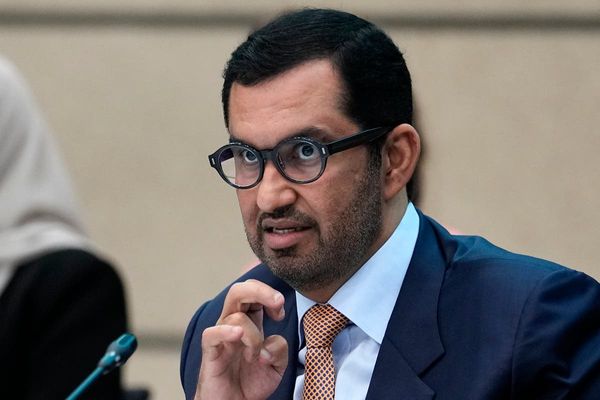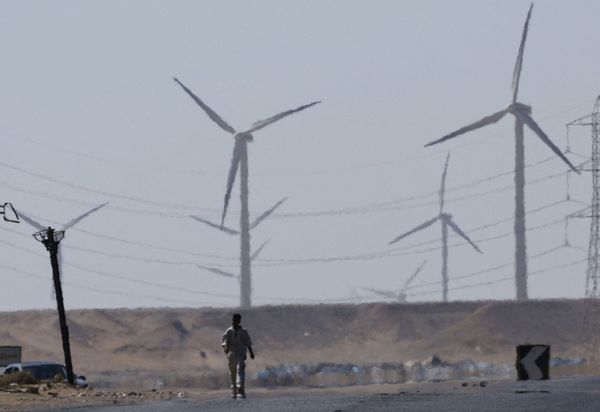
The phase down of fossil fuels is “inevitable”, the president of the next UN climate summit has said, but can only happen when the world has ramped up its renewable energy capacity.
Sultan Al Jaber will host crucial climate talks, called Cop28, in the United Arab Emirates in November, while retaining his role as chief of UAE’s national oil company Adnoc, which is increasing its production capacity.
“Phasing down fossil fuels is inevitable and it is essential – it’s going to happen,” said Al Jaber, in an interview with the Guardian. “What I’m trying to say is you can’t unplug the world from the current energy system before you build the new energy system. It’s a transition: transitions don’t happen overnight, transition takes time.”
Al Jaber’s dual role as has attracted the ire of campaigners, though he has been supported by governments including the US, the UK and the EU. He has been under attack after appearing to try to shift the focus of the talks from the phase out of fossil fuels – a key demand from more than 80 countries – to a phase out of fossil-fuel emissions.
Al Jaber said he welcomed the scrutiny. “When we signed up to the hosting of Cop, we knew exactly what we were signing up to. I don’t think there has ever been a country that has hosted the Cop that did not get this type of pressure or heat from activists and media, so that’s part of the game,” he said. “The scrutiny sometimes also makes us dig deeper into issues, understand better, analyse more … to draw better conclusions. Never have I said that I have all the solutions, or I have all the answers.”
On Thursday, Al Jaber will lay out his plan for Cop28 before ministers from about 40 countries, including the EU, Canada, China and the G20 group of large developing economies, at a meeting in Brussels.
The Cop28 plan is likely to include a target of tripling global renewable energy production, which the developed and developing world support. The global stocktake, which is the first assessment since the Paris agreement of 2015 of the progress countries have made towards emissions reduction, will also be a key focus, but the UAE has decided against “naming and shaming” countries that are falling behind.
There will also be a strong emphasis on the “inclusivity” of Cop28, with plans for greater representation of youth groups, civil society, Indigenous people and women.
However, another likely key part of Thursday’s plan could be more controversial, which is the inclusion of fossil fuel companies at the Cop28 talks. Some fossil fuel companies have been forming a “global alliance” that would pledge action on the climate, including moving to net zero greenhouse gas emissions.
This is likely to rely on cutting emissions from their production, and carbon capture and storage technology. CCS is controversial because many scientists and campaigners believe it is a distraction from the need to stop extracting fossil fuels.
Al Jaber, speaking on a visit to London before the plan was completed, did not give details but hinted that fossil fuel companies were key to his vision. “They [oil and gas companies] are not being seen as part of the solution – so we need to stop that perception,” he said. “They must be invited, they must be given the responsibility, and they must be held accountable, through a proper monitoring arrangement.”
He spoke in favour of CCS, citing the Intergovernmental Panel on Climate Change, the body of the world’s leading climate scientists, that said earlier this year that CCS would play a small role in reaching net zero. “The signs are crystal clear: the IPCC report is saying in order for us to achieve net zero by 2050, CCS will play a role. Why are we all accepting the IPCC report, except for this one point?” he asked. “[But CCS] is only one element of a much bigger equation.”
Al Jaber said he was committed to “a transformational Cop, a gamechanging Cop that will help correct the course, and a Cop that will deliver real and achievable results through action and unity”.
He added: “Let’s accelerate that transition [to a phase down of fossil fuels] by investing in reducing emissions from the current energy systems, to the point where we completely eliminate those emissions, while we phase up investments in the zero carbon emissions sources of energy, or the new energy system that consists of zero emissions. They need to happen in parallel and we need soon to find the point in time where they converge.”
Al Jaber also took aim at governments that are failing to “get rid of all the red tape across the world” that is holding back the development of low-carbon energy. He would not single out the UK, where planning rules effectively still ban onshore wind turbines and poor grid connections mean new projects can take a decade to come into operation. But he has long been familiar with the UK market, where Masdar – the UAE renewable energy company of which he is co-founder – is involved with several offshore wind projects.
He said: “There are places on Earth today where it takes you forever to get permitted for renewable energy assets, five to 10 years. Which private capital is going to put their money on hold for five years to get the permit? We need to move fast, we need to incentivise through policy, not make policy be a roadblock or hurdle.”










